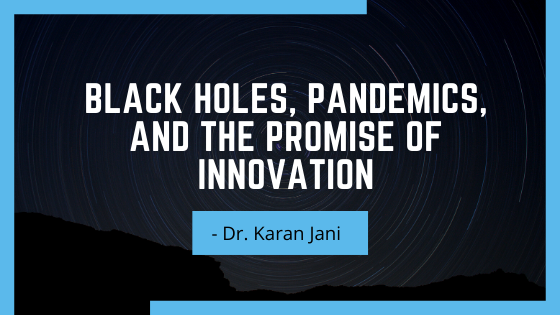Black Holes, Pandemics, and the Promise of Innovation

“What leads to the generation of a black hole?”
“What happens to someone/something when it enters a black hole?”
“Can a black hole swallow the Earth?”
“Has NASA really discovered a parallel universe where time is running back?”
“How does one get started on research and convert their academic research into commercial research?”
“How does a bachelor in college become an astronomer or a cosmologist?”
These were a few questions out of the many that dominated GUSEC’s webinar on ‘Research & Innovation in the post-COVID Era on May 29, 2020. From trying to make sense of how black holes work, to looking for advice as to how to turn to research or astronomy as a career option, the webinar saw enthusiastic students, startups, and academicians with Dr. Karan Jani, astrophysicist, scientist in the LIGO Experiment, and a research scholar on education and national security policies.
Dr. Jani, who has quite a few accomplishments under his belt, some of which comprise of the Nobel-winning LIGO experiment and his collaboration with the director of Harvard’s Astrophysics Dept. in calculating the exact number of stars that are capable of converting into a black hole, talked about ways to sustain and facilitate education and research in the time of a pandemic. In this article, we look at a few highlights from the webinar, which may also serve as inspirations to innovate for students and startups alike.
“Remote Connection is the way forward”
Dr. Jani talks about how the time period of the pandemic has proven to be the most productive for him and how remote/virtual communication has been deeply instrumental in upholstering his productivity. He talks about how using some form of Zoom, Cisco Webex, Slack or Github for the past many years has enabled him to focus on his research, especially in the past three months. He advises that a system of virtual communication should be in place in all educational institutions at all times, and not just in the times of a pandemic.
“Innovation & Crisis complement each other”
The Great London Plague of 1665 led to the discovery of Newton’s laws of gravity; WWI led to the revolution in quantum theory, and WWII both connected as well as divided the world with the advent of nuclear reactors. Similarly, the cold war led to the first man landing on the moon. In India, Kargil tensions led to the testing of India’s first underground nuclear missiles in Pokhran, and the 2008 recession led to the revolution in Machine Learning & Artificial Intelligence. We can only wonder what this pandemic is going to bring.
“Millennials are changing the investment game”
Dr. Jani then talks about two companies – Moderna, a biotech company that is currently in the process of developing a vaccine for the SARS-CoV-2 Virus; and Tesla Motors, known for automated cars. He then reveals the stock prices of the two, which increased by 300% after WHO declared the COVID to be a pandemic – this fact reflects the risk-taking mentality of millennial investors who value innovation and would rather invest in a R&D company, the long-term results of which may or may not even be fruitful – completely toppling the status quo; and says “it’s a nice paradox I’m happy to see”.
Takeaways for Students
Dr. Jani said that degrees stopped mattering to him after he graduated from school. He urged students to look beyond their classes, curriculum, and degrees. He asked students to look beyond their classrooms and never give up their pursuit of knowledge, and laid emphasis on the importance of one’s online presence, viz. LinkedIn profiles and having their resumes online, which can prove to be instrumental while establishing a network and looking for opportunities to innovate.
Takeaways for Startups
Today, 5G makes it possible for viewers of a lecture to see the live hologram of their lecturers; innovative startups may utilize this opportunity and do what traditional companies aren’t willing to.
This point in time in the world has seen the emergence of the most health-conscious population than any other time. More and more people are concerned about their health, lifestyle, and diet, and startups might want to innovate around tools that facilitate health-consciousness.
Dr. Jani wrapped up the webinar urging the viewers to innovate and said, ”This has been an unusually nice time in terms of opportunity; because everything is broken and most of the established, traditional models aren’t scalable anymore. Can you think of something unique that can scale?”
In conclusion, whether you’re a student on the lookout or a startup already in the process of innovating, we must always be in the constant pursuit of learning and innovating. As far as the pandemic is concerned – this too, shall pass.
